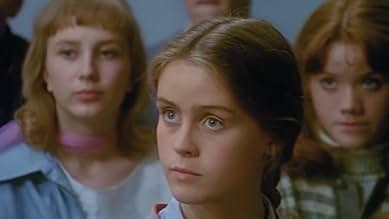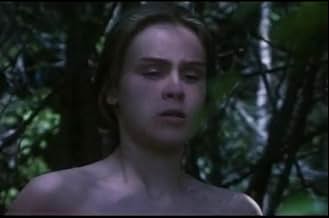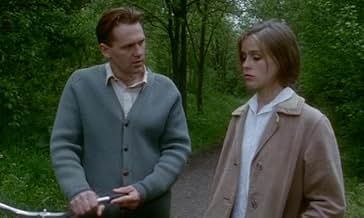IMDb RATING
6.9/10
1.3K
YOUR RATING
The Other Side of Sunday criticizes the small, and often tight church community. We follow the Preachers Daughter; Maria, in her journey to liberate herself from the stiff church community a... Read allThe Other Side of Sunday criticizes the small, and often tight church community. We follow the Preachers Daughter; Maria, in her journey to liberate herself from the stiff church community and her strict religious father.The Other Side of Sunday criticizes the small, and often tight church community. We follow the Preachers Daughter; Maria, in her journey to liberate herself from the stiff church community and her strict religious father.
- Nominated for 1 Oscar
- 9 wins & 7 nominations total
Petter Width Kristiansen
- Pål Helge
- (as Petter With Kristiansen)
Featured reviews
Great norwegian movie about a priest's teenaged daughter, who has different views on religion than her father... Great movie. I am proud to be Norwegian when I see this movie...
It is the late 1950s in a small village in Norway. Bjørn Sundquist plays Johannes, a priest in the Church of Norway. Johannes has a wife, a son, and two daughters. The story revolves around Johannes, his pretty older teenage daughter Marie (Marie Theisen), and his church organist and assistant Mrs. Tunheim. Oddly we never know the family name of Johannes' family--the only person with a last name is Mrs. Tunheim, and we never know her first name. Johannes is stern and unyielding in his behavior. In the pulpit he is seen promoting the usual Christian pieties; his congregation looks like they are attending a funeral rather than a service. The rule is to look straight forward during a service and the first hint we get of what is to come is Marie's pinching her sister during a service. Johannes is harsh with his family and a prominent theme is the ongoing battle of wills between him and Marie. However, in several scenes we see a human side of Johannes that somewhat soften the initial stereotypical image that we might have of him.
Marie struggles to understand her religion and her burgeoning sexuality. Even in the face of the rigidity of her father's religious positions (or because of them) Marie has questions. As one example of her questioning consider this conversation with Mrs. Tunheim:
Marie: Do you think God did a poor job when he created man?
Mrs.Tunheim: Why do you ask?
Marie: He created us so that we have to ask forgiveness all the time. Isn't that a poor creation?
Or this reflection: "Isn't it just some sort of invention to love and cherish until death do you part? I love meatballs, but I cannot promise God that I will do that for the rest of my life." The movie often mixes humor with its more serious considerations.
Music plays an essential role in the film, ranging from Bach to 50s pop ballads. Music contributes to some exquisitely beautiful scenes like the one where Marie swims naked in the river.
All the actors capably handle the subtle complexities demanded of them, but it is ultimately Marie Theisen who carries the film and raises it above the average. She perfectly captures the questioning innocence at the core of Marie's personality and the stubborn persistence to find her own way in an environment that is trying to impose conformity. Marie is not about to give up on God, she is just looking for her own God--a God of nature, a God of forgiveness, a God who likes us when we are happy. This movie can be seen as a kinder and gentler version of a Bergman film that treats the same themes.
Expect surprises on the way to a definitive final scene.
Marie struggles to understand her religion and her burgeoning sexuality. Even in the face of the rigidity of her father's religious positions (or because of them) Marie has questions. As one example of her questioning consider this conversation with Mrs. Tunheim:
Marie: Do you think God did a poor job when he created man?
Mrs.Tunheim: Why do you ask?
Marie: He created us so that we have to ask forgiveness all the time. Isn't that a poor creation?
Or this reflection: "Isn't it just some sort of invention to love and cherish until death do you part? I love meatballs, but I cannot promise God that I will do that for the rest of my life." The movie often mixes humor with its more serious considerations.
Music plays an essential role in the film, ranging from Bach to 50s pop ballads. Music contributes to some exquisitely beautiful scenes like the one where Marie swims naked in the river.
All the actors capably handle the subtle complexities demanded of them, but it is ultimately Marie Theisen who carries the film and raises it above the average. She perfectly captures the questioning innocence at the core of Marie's personality and the stubborn persistence to find her own way in an environment that is trying to impose conformity. Marie is not about to give up on God, she is just looking for her own God--a God of nature, a God of forgiveness, a God who likes us when we are happy. This movie can be seen as a kinder and gentler version of a Bergman film that treats the same themes.
Expect surprises on the way to a definitive final scene.
Enough to put you off organised religion for life, this one.
A Norwegian girl on the cusp of adulthood in the 50's decides she no longer wants to be a Christian. This dismays the local community including her father, who just so happens to be the town priest. But what is boring sermons and staid hymns compared to boys, rock 'n' roll and long, refreshing dips in the nearby stream? No contest, really.
It's impossible to not be on Maria's (our rebellious protagonist) side as her dad never listens, her mother always takes his side and her siblings are under their thumb as much as she is. There's certainly a good way to have faith, but it's not to be found here: where apparently laughing at someone farting at the dinner table or wearing earrings is considered a major sin.
Marie Theisen is fantastic in the main role, alternating between euphoria at her newfound freedom and determination at her family's attempt to quell her uncovered adventurous spirit. She also says 'dog darn' a lot to avoid blasphemy, which makes no sense but is highly amusing.
Probably not one for regular churchgoers, who might find it a 'slur' on their beliefs. But everyone else though, it's an impressive piece of work that might just make you think twice before blindly believing in the hereafter... 7/10
A Norwegian girl on the cusp of adulthood in the 50's decides she no longer wants to be a Christian. This dismays the local community including her father, who just so happens to be the town priest. But what is boring sermons and staid hymns compared to boys, rock 'n' roll and long, refreshing dips in the nearby stream? No contest, really.
It's impossible to not be on Maria's (our rebellious protagonist) side as her dad never listens, her mother always takes his side and her siblings are under their thumb as much as she is. There's certainly a good way to have faith, but it's not to be found here: where apparently laughing at someone farting at the dinner table or wearing earrings is considered a major sin.
Marie Theisen is fantastic in the main role, alternating between euphoria at her newfound freedom and determination at her family's attempt to quell her uncovered adventurous spirit. She also says 'dog darn' a lot to avoid blasphemy, which makes no sense but is highly amusing.
Probably not one for regular churchgoers, who might find it a 'slur' on their beliefs. But everyone else though, it's an impressive piece of work that might just make you think twice before blindly believing in the hereafter... 7/10
Maria is the teenage daughter of a rigid, authoritarian pastor in a conservative branch of Norway's state church in the early 1960s, and the time is approaching when she is supposed to be confirmed. However, she dreads her upcoming confirmation, because she doesn't want to live the drab, glum life that women in her church seem to lead. She wants to enjoy her youth, but her father even objects to her going to a café for a Coke with her friends.Her mother's serious illness and academic pressures only add to her stress.
Maria befriends a woman who is a member of her church; the two of them are obviously kindred spirits who feel constrained by the strict rules of their community.
What will she decide when the time comes to take her confirmation vows, especially after her life is shaken by bereavement? Almost all the coming of age stories I have seen or read have been about boys or young men. This film is unusual in that it's about a young girl trying to figure out who she is and her place in the world.
Maria befriends a woman who is a member of her church; the two of them are obviously kindred spirits who feel constrained by the strict rules of their community.
What will she decide when the time comes to take her confirmation vows, especially after her life is shaken by bereavement? Almost all the coming of age stories I have seen or read have been about boys or young men. This film is unusual in that it's about a young girl trying to figure out who she is and her place in the world.
Beautiful film for the art to describe the ineffable essence of an age, the subtle desire, the fear of social class, the image of religious vision like strong and necessary shell , the forms of beauty. It is exploration of a special metamorphosis in a delicate way, in kindly images, refined colors, with deep respect for atmosphere's details.
A young girl in an ambiguous war with a rigid world. A father for who the rules are untouchable, hypocritical gestures of a small universe, ethics like masks of general peace, slices of ordinary existence and vagueness of desires, dreams and feelings.
Mary is not a victim or rebel spirit. She is only explorer of her life. Her bold gestures or words, the innocent game, the refuge beyond the family's sphere are not elements of a real fight but steps for self definition.
It is a splendid film for the science to suggest the forms of existence's assume. For the sweet colors and for gentleness of artistic expression. For the discover of emotions like seeds of everyday. For the taste of Sunday.
A young girl in an ambiguous war with a rigid world. A father for who the rules are untouchable, hypocritical gestures of a small universe, ethics like masks of general peace, slices of ordinary existence and vagueness of desires, dreams and feelings.
Mary is not a victim or rebel spirit. She is only explorer of her life. Her bold gestures or words, the innocent game, the refuge beyond the family's sphere are not elements of a real fight but steps for self definition.
It is a splendid film for the science to suggest the forms of existence's assume. For the sweet colors and for gentleness of artistic expression. For the discover of emotions like seeds of everyday. For the taste of Sunday.
Did you know
- TriviaIn 1997, this movie was nominated for an Oscar in the category "best foreign language film". Marie Theisen, who was 15 years old during the filming, had the main role in it. In an interview, she said that she realized her full nude swimming scene was difficult to accept for the American audience, but she thought it was well done and absolutely necessary for the context.
- ConnectionsReferenced in Norsk film er ____!?: I FOKUS på Norske Oscar-nominasjoner (2022)
- SoundtracksLove letters in the sand
Performed by Pat Boone
- How long is The Other Side of Sunday?Powered by Alexa
Details
- Release date
- Country of origin
- Language
- Also known as
- The Other Side of Sunday
- Filming locations
- Production companies
- See more company credits at IMDbPro
Box office
- Gross US & Canada
- $4,769
- Opening weekend US & Canada
- $2,621
- May 3, 1998
- Gross worldwide
- $4,769
Contribute to this page
Suggest an edit or add missing content
























